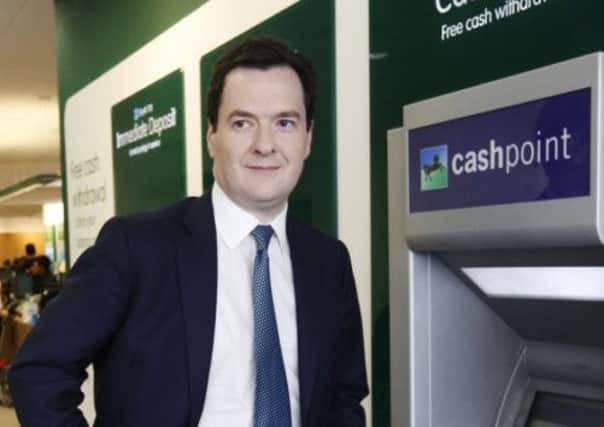Blow for George Osborne as Britain borrows more


The Office for National Statistics (ONS) revealed public sector net borrowing stood at £118.8 billion in the year to the end of March – about £300 million higher than the £118.5bn recorded for 2011-12.
The revisions to annual data overshadowed encouraging figures for May, which showed that a deal to recoup £3.2bn of taxes from Swiss bank accounts helped cut public sector borrowing to £12.7bn from £15.6bn a year earlier.
Advertisement
Hide AdAdvertisement
Hide AdThe revelation comes ahead of the Chancellor’s spending review next week, when Mr Osborne will unveil plans to slash departmental spending in 2015-16.
The figures are a blow to Mr Osborne who has controversially insisted on sticking to an austerity programme with debt reduction at its heart, despite the International Monetary Fund claiming that the policy was a “drag on growth”.
Prime Minister David Cameron’s official spokesman said: “Today’s data demonstrates that the government is getting a grip on public spending.
“I think that the data today shows the deficit reduction plan working. Obviously, that needs to be stuck to. That is exactly what this government is doing and of course, as part of that, you will be seeing the conclusion of the 2015-16 spending round next week.”
Should the deficit rise, as forecast, to £120bn this financial year, it will mean an increase in net borrowing for two consecutive years.
Labour said the borrowing rise was “another damaging blow to George Osborne’s economic credibility”.
Chris Leslie, shadow financial secretary, said: “The reason why the Chancellor is failing to get the deficit down is because he has failed to boost living standards and economic growth.
“With this economic failure as the backdrop to the spending review, George Osborne must finally act to get our economy moving with a long-term plan for growth.”
Advertisement
Hide AdAdvertisement
Hide AdThe government struck a deal in January with Swiss authorities to recoup tax from UK residents’ bank accounts in the country.
The figures for borrowing in May show that, without the Swiss tax boost, the month’s deficit would have been broadly level with the previous year.
Including a £3.9bn cash transfer from the Bank of England’s quantitative easing fund – the Asset Purchase Facility – saw May’s deficit fall by £6.9bn year on year to £8.8bn, the ONS said.
Stewart Hosie, the SNP Treasury select committee member, said the reduction in borrowing in May was welcome, but pointed out it was down to quantitative easing and one-off tax receipts from Switzerland.
“George Osborne must not use this unexpected one-off fall to camouflage the failure of his economic policy,” he said.
Treasury Minister David Gauke admitted that while there was “some good news, the government has still got an issue with our deficit”.
Economists said the government faces an “uphill battle” to cut the deficit and warned years of austerity lie ahead.
Vicky Redwood, economist at Capital Economics, said: “With borrowing still at very high levels, next week’s spending review is a reminder of how much austerity still lies ahead.”
Advertisement
Hide AdAdvertisement
Hide AdBritain’s net public sector debt, ignoring bank bailouts, stood at 75.2 per cent of gross domestic product or £1.189 trillion in May, higher than 71.1 per cent or £1.095tn a year earlier.
The independent Office for Budget Responsibility forecasts this year’s deficit remaining stubbornly high at £120 billion.
The Chancellor wants £11.5bn of spending cuts across government departments in the year after the next general election.
Despite the ONS figures, some economists believe the deficit is on course to come in below target for the year as the economy improves. IHS Global Insight chief UK economist Howard Archer said: “It looks increasingly likely that Chancellor George Osborne will meet his fiscal targets for 2013-14 and could very well undershoot them.”
David Kern, economist at the British Chambers of Commerce, said: “Next week’s spending review gives the Chancellor an opportunity to reallocate resources, focusing on measures to boost growth such as infrastructure investment, while continuing to make real cuts in spending.”
SEE ALSO